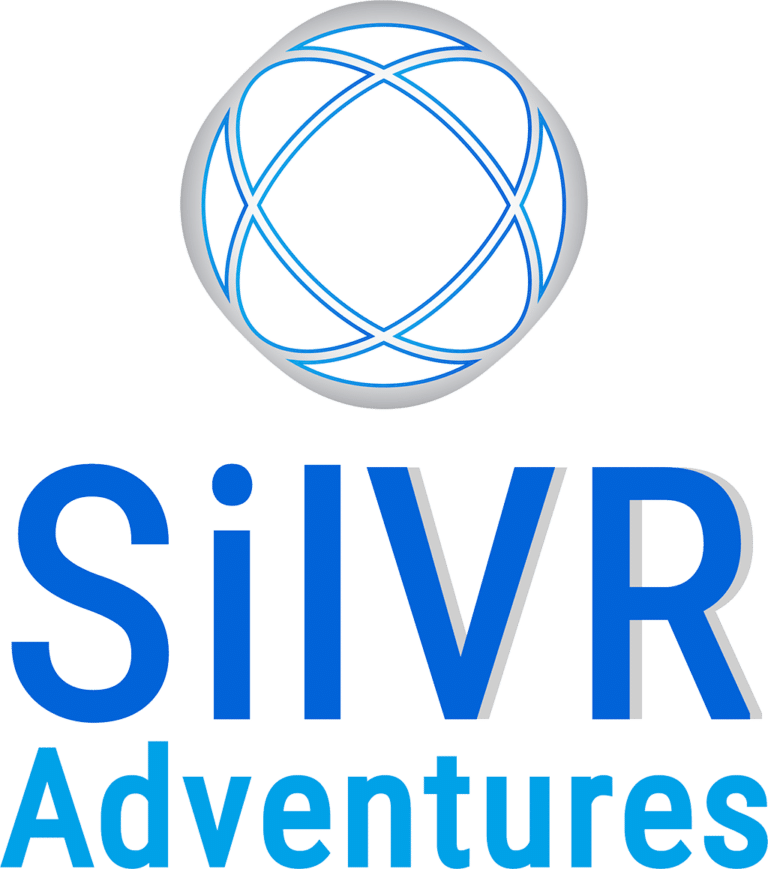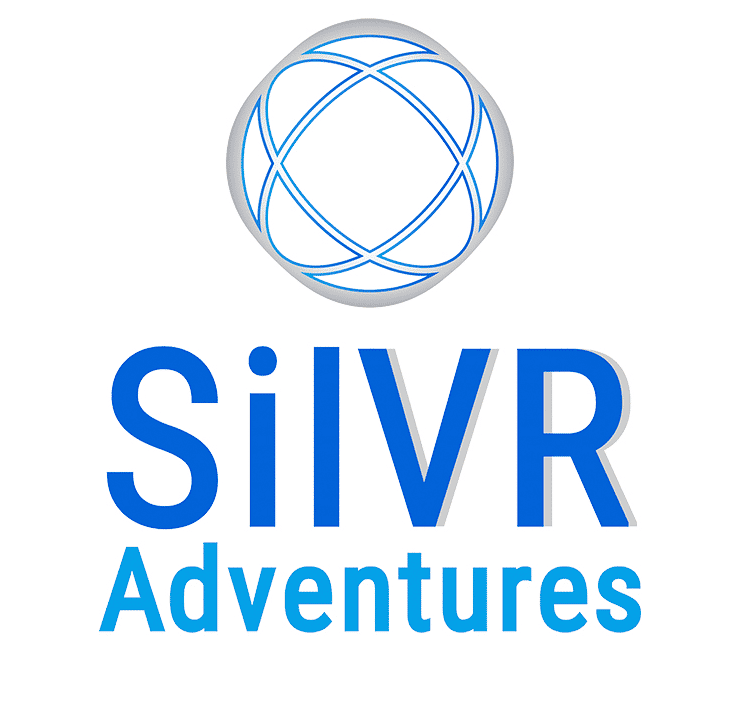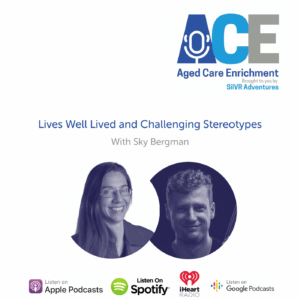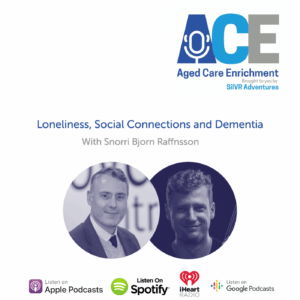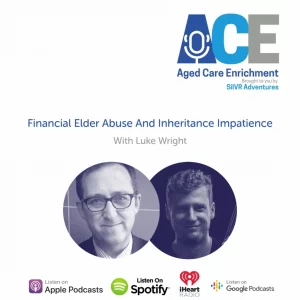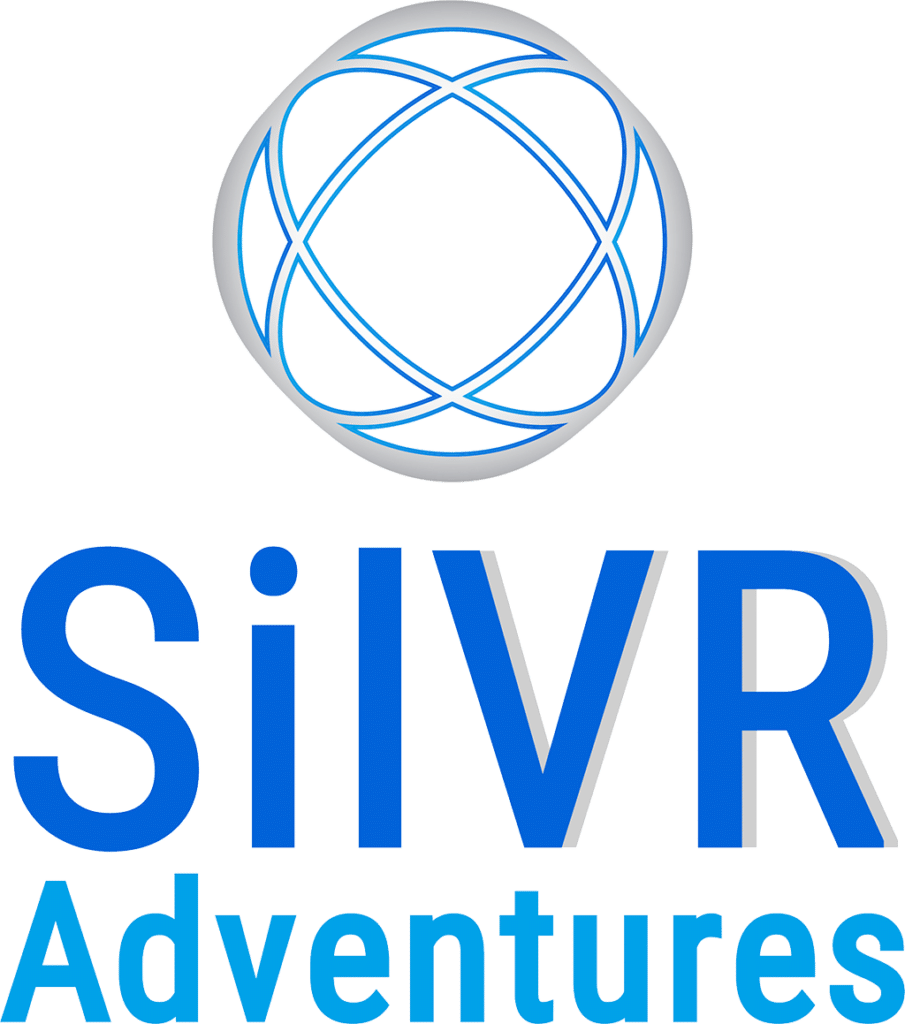Alive Inside followed the company Music and Memory as it helped older adults in care reconnect to themselves and reawaken with the help of their favourite music. You might remember the scene with Henry’s whole face and body language lighting up when he hears songs from his youth – that clip has had over 7 million views on Youtube!
Despite the background in music and filmmaking, this conversation with Michael is about human connection, and what underpins or should underpin any care that we seek to provide for people, no matter their age. Micheal has a great talent at converting his ideas into films and conveying his thoughts into words, and we’re sure you will enjoy listening to this discussion.
Transcript
Ash de Neef: Hey Michael, thanks for joining us on the show today.
Michael Rossato-Bennett: My pleasure.
Ash de Neef: You’re calling in from New York. It looks like I see buildings behind you out the window.
Michael Rossato-Bennett: Yep. Beautiful New York City.
Ash de Neef: Is it a frigid and cold at this time of year?
Michael Rossato-Bennett: It is very cold right now. It’s a kind of cold that even cuts through the heat in the building, you know?
Ash de Neef: Yeah, well for people haven’t heard your name, maybe you can, give us some background into your work and why they should know your name.
Michael Rossato-Bennett: Oh, I don’t know if anybody should know me, but, um, I am a documentary filmmaker and I had the pleasure of making a film. I was making a film for a small foundation about how music seemed to be a good thing to give to elderly people. And while we were making the short film, I put some headphones on an old, old man named Henry in a nursing home.
This man had been in a nursing home for 10 years. He, didn’t recognize many people, he talked to himself. And we put this music on him and he came to life and it was really beautiful. But then we took the headphones off of him and we carried on this conversation with this human that was spectacular. Hidden inside this 94 year old man that nobody visited really, except his daughter, was this incredible artists, this incredible human being that had been lost. And the music woke up something in his deep brain and it floored me.
Michael Rossato-Bennett: I mean, to take a step back, I think that life in the modern culture is problematic. You know that I think so many people in different ways, even though technology has given us such incredible power. The power to be efficient in the way we make food, the way we communicate. The way we, create economies, perhaps it’s the cost of our economies that seems to create a sort of loss in the human relationship world. And, and that’s felt in families and that’s felt in communities and it’s felt in ageing.
And there’s so many people in the world that are somewhat shut down. I’m sure you are somewhat shut down in some ways. In other words, the distance between you being fully alive and the life that you are living, there’s a difference there. And when I saw this older man come alive, it staggered me because my whole life I myself have dreamed of having the courage to be more and more alive.
And when I saw that it was possible to do something for this really enormous population, that had been abandoned and was suffering the pain of abandonment, which is one of the greatest human pains possible. And sojust personally, seeing that awakening just was so important to me.
Because, I am somebody that truly, truly has spent a lifetime trying to get to the bottom of what does it mean to be truly alive as a person? What does it mean to be alive, with other people, what does it mean to be alive with life itself? What does it mean to be alive as a living, being on a living planet? These are actually central questions to our culture and our existence even.
And so anyway, I knew in that moment when I saw this old man come to life, I knew that I wanted to spend whatever it took in terms of energy. That this was a unique opportunity that I was in, where if I told this story, I could change life for a lot of people. And it turned out to be this incredible journey that I couldn’t have predicted.
Michael Rossato-Bennett: I mean, literally this idea that music touches a part of the brain that people with Alzheimer’s – it’s one of the only ways in mid to late-stage Alzheimer’s that you can awaken functionality.
And Alzheimer’s is one of the saddest things that human beings can endure the loss of memory, the loss of self. And to have that awakened, it just I mean, I’ve seen kids taking care of their parents and their parents haven’t recognized them for two years.
And then we put some music on one of these elders heads and they listen to songs from their childhood and their eyes wake up and they look at their child and they say, oh, hi, how are you? You know, and they say their name.
And these kinds of experiences are literally, they’re beyond priceless. Like they just, when you witness any of this, it just, that’s why the film I think was so touching was because it touches something inside all of us. When we see somebody who’s dead come to life.
Because we all know we’re going to die right. It’s what’s facing all of us. We’re all mortals, we all have only a short time on this stage.
And so deep inside all of us, we push it down. We hide from this idea that we’re not here for long, but that is the ultimate truth of being a human being. Is that your conscious experience of being a living thing is short-lived. It may seem like a long time, but the older you get, the more you realize that it is short-lived and precious. And if you can give somebody else a feeling of being more alive, especially someone who’s had it taken away, that’s probably one of the best things you can do as a human being. You know, like that’s what you need mentors for, it’s like people that can, save you wasting time in your life.
Save you limiting your choices are or not understanding really what’s possible for yourself in being a living being. And it’s something I absolutely believe is ignored and not taught. And that’s part of the work that I’ve inspired with aliveinside.org. How do you allow younger people to be the people that wake these elders. That actually get to sit with them and experience what I experienced, what we experienced. That kind of magic when you see another human being come to life.
Ash de Neef: Yeah, that’s fantastic. I’m really glad that you started with explaining that the clip with Henry and the iPod. I think for a lot of people, that’s going to be their starting point. They might have seen that, I know it was it was quite hard to avoid online maybe about 10 years ago now.
It’s only been this year that I’ve seen the full film and I think. It’s really amazing. I’m really excited to tell people about the film because it is, as you said, very emotional. One of the things that you do really well, I think in the film is juxtaposing how alive people become with music, with the hospitalized nature of their living environment and how sterile it can feel.
What was it like being in those environments for such a long time and trying to capture these great human moments.
Michael Rossato-Bennett: It’s actually a sad, and yet funny question – it’s a sad, experience. We are as human beings, we’re not meant to be institutionalized, not at the beginning of our life, not in school, not in the end of our life, not in prisons. I mean, the greatest punishment that we can have is to be imprisoned, to be institutionalized.
And some of these elders, their lives were not unlike being imprisoned – even though there’s phenomenally good people involved. It’s interesting. I get a little bit, I don’t know how to say this in a non-provocative manner, but you know, when you fall in love with somebody and you hold them and you feel that they’re like, “oh my goodness, I I’ve been waiting for somebody to hold me like this” and their hearts melt.
And when their hearts melt, you feel the energy of their life coming to you and your energy flows to them. And to connect with another being with no threat is the ultimate safety, and it’s what’s completely missing in the modern life cycle.
Like for these elders to be alone, to be abandoned, to actually have nothing… I say it in the film. You don’t no one there to accept or inhale their wisdom and their gifts. Like I’m older than you, you know, if you sat down and talked with me, I could probably save you 10 years of stupidity in your life. That’s what wisdom is, nothing more than like, if you do this, you’re not going to waste time.
And people are so transient and virtualized that our skills at connection with ourself, with the life inside of ourself, with the life inside of another being with the life inside the planet, we’re ignorant. We have, we can always, like as soon as you get triggered, you can instantly hide in your phone. You can hide in a movie, you can hide in a song, and you don’t get the powerful wisdom of being challenged by life and failing. And working through it with other people, with a tribe or designed or tribal, we’re designed to be tribal with our families, with the people we love with our community.
And when you take an older person and you isolate them, some small part of them dies. You’re treating them like a thing. When you take a young person, you put them in a school and you say, “achieve according to these requirements or you’ll be a failure”, you break them away from their family, from their tribe.
It creates emptiness and loneliness, it’s literally a plague upon the modern world. And it’s very interesting to me that music, that’s why music is so incredible. Like you told me you were in music school, right?
You know, what did you feel when you saw the clip of Henry?
Ash de Neef: At the time I remember talking to friends about, this was very early in music school. And I was thinking, is this a bit self-indulgent to be studying music? Is this a worthwhile thing to be doing? And then a friend showed me the video and I felt… I don’t think it was like a, “oh, now this is all clicked in place”. But it was like, oh yeah, you can actually, it can actually change people’s lives.
It’s not just me doodling on stage.
Michael Rossato-Bennett: That is like what happened to me a hundred thousand times. Like a hundred thousand people have come up to me and said, I’ve made music my whole life and I’ve never known why. Now I know why, now I know what it is. Cause you’re right, most people think music is just a sort of self-indulgent practice done by pop stars who are egotistical narcissists, who just want everybody to look at them. But that’s not the power of music.
Music is a beat? What is the beat? The beat is the heartbeat. That’s it. And if you look at what happens when you play a beat for human beings, they dance. What is dancing? Dancing is people moving in the same rhythm that’s called entrainment. As you in train your body to the beat, you are moving in sync with other living beings.
The functionality of music is that an increases tribal connection. It was one of the primal technologies that we invented. We invented music to take disparate humans and get them on the same heartbeat.
Michael Rossato-Bennett: And in making Alive Inside I shot footage of hundreds and hundreds of elders, and I was searching for wise enlightened elders. And although there was a resonance of it, I didn’t find it. I found so many people who reached the end of their lives, not in our storybook fashion, right? Like what’s supposed to happen at the end of the life, you’re supposed to be loved, you’re supposed to be honored, that is natural, that is truly…
If you give and give and give like most humans beings do, we’re wired, we are wired to give. Once you make a baby, you’re on a disaster course with selfishness, you know, you just have to give and give and it makes no sense. And then you’re wired to die. You know, it’s not a very epic wiring, but we have this capacity to be more than our wiring, right, more than what’s possible.
And I think that’s interesting, but I don’t feel like we have really risen to the challenge of it. If we had, we wouldn’t have these places where elders are abandoned. We wouldn’t have educational systems where kids are basically abandoned. And that’s what was so beautiful about Alive Inside that like, okay, here are these people that are suffering, what do we do?
Oh, let’s just honor them by giving them the music of their childhood. Oh my God, Look at the life in them. Yes. That life is in you when you should be a master of that. It’s not just a parlor trick, it’s showing you truly your possibility as a human.
Ash de Neef: Thank you so much for, for sharing that. I think for our audience who are perhaps working in aged care and looking after elders every day, they maybe a bit rundown by the tasks they have to do or…
Michael Rossato-Bennett: Oh, so totally. These are the best people in the world, many of them. But what they’re asked to do is also to be a thing, right? That’s what’s so painful about working in elder care. You know, you have the biggest heart in the world, you have people who need you. And there are amazing people who, who can navigate this and those people are literally almost like saints.
But they’re living within a system. In America 69% of elder care is for-profit institutions. In my humble opinion, it’s ridiculous. People even talk about privatizing youth education and there’s a struggle with that, right?
No, no, we shouldn’t do that because in our primal selves, you care for your young, you care for your old out of love, not for profit. And I’m just saying that that’s a conflict of interest. That in the end weighs on people, and people think there’s no, there’s no alternative.
But the thing that I find so interesting is the alternative is inevitable in a way, you know, we’re, finding ourselves facing these enormous problems of relationship. The relationship of the human technological world with the living world, that’s the primary conflict we’re facing right now.
Like we are using up the Earth’s biological systems at a rate that’s greater than the planet’s capacity to reclaim its biological functionality. So we as a species we are, any time a species has to face the death of its environment it must evolve or die. That’s it that’s how any species works.
And we are a species, we’re animals and we are going to change to meet this requirement. And the question is how much pain will we have to endure before we do it. And most species have to face a tremendous amount of pain before they evolve. And maybe, our minds, our cognitive ability is so incredible that it basically constantly saves us from crashing. And so, you know, it’s going to be very interesting to see how the next couple of hundred years plays out.
But the people who are masters of relationship, like the people who work in elder care. I mean, I, I love the people who work in elder care. Some of the most amazing humans work in elder care. But they’re not empowered, most of them. Most of them are, you know, the ones that are great, are kind of somehow figuring some way to squeak around the edges and be their big human hearts. And many of them get, get burned out.
In the last 10 years, I’ve seen the best being either cast aside or just moving on to something else, and, it is a big problem. And the solution is not simple. I’ve been to all these conventions, you know, elder care loved Alive Inside. It’s a simple technological solution, very cheap produces great value.
Kind of like, the VR experience as well – it’s pretty inexpensive. It creates great value, right. But that’s low hanging fruit the deeper. The deep roots are much more challenging and revolutionary, and we’re not willing to yet, but we will, to address them.
And that’s what I’ve always been really interested in is the question of, and I don’t really have answers, but you know, “how do you get everybody what they need?” And on an individual level, oh this person just needs some companionship. Oh, this person needs some music. Well, this person needs a VR bucket list adventure. Oh, this person needs some good food and this person needs a hug.
On that level, it’s pretty easy to navigate. But in eldercare I’ve seen one person responsible for a hundred people’s goodwill. And so it becomes almost impossible.
And I’ve watched the elders reduce their expectations of what they need. And, basically I’ve seen many people die, humbly and accepting that they can’t get what they need. Many people live their lives, accepting that they can’t get what they need. And that is literally the saddest outcome, and one that so many people are living. And so, I’m just very interested in anything that gives people, a path that yields, a fullness of life.
And that’s why I was so drawn towards giving this music to these people with Alzheimer’s. Because I got to experience it in my body, I got to see another human being coalesce out of the darkness. I got to see them become themselves when they’d been lost. And you know, I think that should be, that’s how all of our children should feel. They should all feel like – well our adults, young adults – they should feel like, “oh, I was lost. But now I’m found, how did I get to be found? What did I have to experience?”
Most people don’t know and they settle, they settle for kind of a half life and they expect nothing more, or they accept false food. So we have to solve this problem because we are a very, very capable organism and we should master our capabilities.
And I think that’s really one of the functions of ageing. And for people that work in, in elder care, I think that that should be a dream and a responsibility like, “wow, how can we take this group of people and make them more alive?”
You know, I always thought it was so funny, right? Like I’ve been to institutions where I’m looking at 600 lonely people, all within a foot of each other. How do you have 600 lonely people when they’re all with other people? What’s going on? What, what isn’t being given? I mean, there are people who have tried to navigate that question and come up with some pretty interesting ideas. And then music is one of them and like sort of talk and communication is another one.
But I mean, I think the base question is how do you awaken a beings, limbic system, it’s consciousness, it’s experience of being alive. How do you all honor that? And how do you allow it, that sense to thrive with other beings. And you have to accept the fact that many, many people have been beaten down their whole lives, and they arrive at the end of the end of their life and they actually have a tremendous amount of trauma to work through.
Like they’re not, they don’t arrive at the end of their life enlightened. And if we were living in a world that had a better outcome for elders, that’s where you would arrive. And, it saddens me that we’re not, there and we should be.
Ash de Neef: Hey Michael. great to chat. I think it’s been really, really great to think about the things that are behind the work we’re doing in caring for elders and what it means to be alive and human.
Michael Rossato-Bennett: It was fun to play with these ideas. I mean, these are the things that, that I’m thinking about and a great pleasure to have the luxury of being able to talk about things.
Ash de Neef: Well, at the very least for people to get a sense of what we were talking about today, they can watch the Alive Inside film, visit aliveinside.org. And, look out for your next film, Michael.
Michael Rossato-Bennett: Yeah and if anybody wants, if any of your caregivers has elders with dementia that need headsets or volunteers to find music for the elders, aliveinside.org can help with that. We have a thousand headsets to give away. Like what I say is we like to shine light into the darkness and create order where there’s chaos, which is basically the basic requirements for human safety.
And once you have human safety, you can feel yourself. And once you feel yourself, then you’re alive you can share that with other beings. That’s what I think is the direction we should go.
Ash de Neef: Awesome. Thanks so much for your time today, Michael.
Michael Rossato-Bennett: Thank you for your questions and for taking the time as well.
